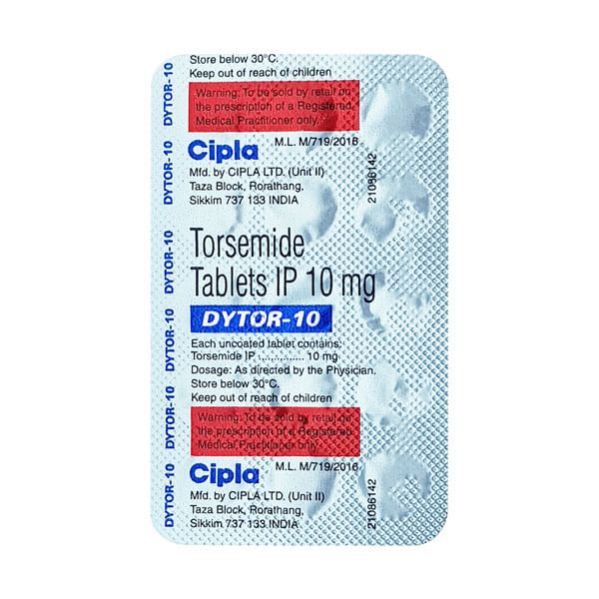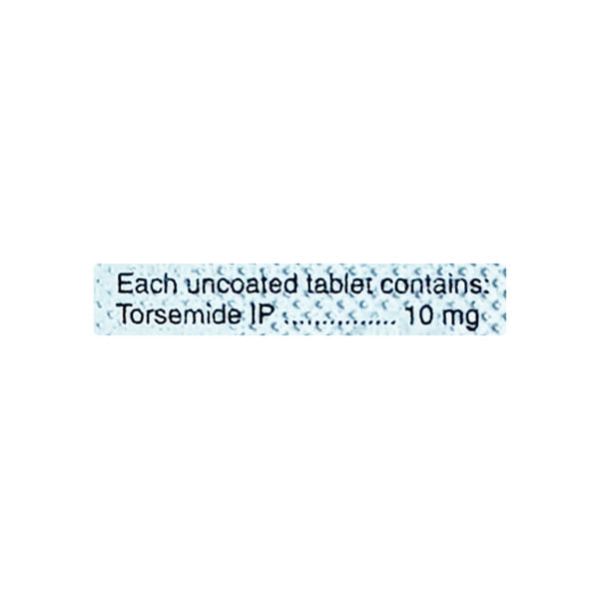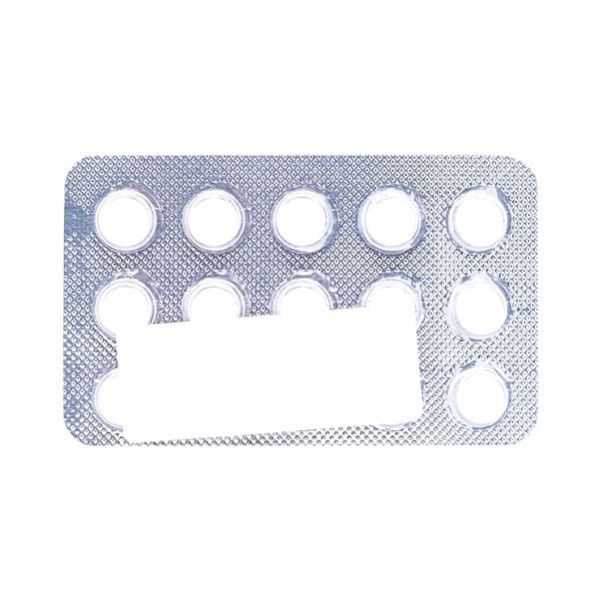Dytor 10mg Tablet 15'S
Torsemide 10 mg
₹ 92.00
₹103
(Inclusive of all taxes)
-

No Warranty
-

COD Avilable
-

Non Returnable
-

cancelable
About this item
INTRODUCTION ABOUT DYTOR 10MG TABLET
DYTOR 10MG TABLET is indicated for the management of oedema associated with congestive heart failure, renal or hepatic disease and essential hypertension. It contains Torsemide which belongs to the group of medicines called Diuretics.
Prior to the management, your doctor may want you to take several blood tests to understand your existing condition. It is not recommended for use if you have anuria (failure of kidney to produce urine), hepatic coma (loss of brain function due to liver damage). Before taking DYTOR 10MG TABLET, inform your doctor if you have any liver, kidney, or heart failure. Avoid consumption of alcohol while taking this medicine. Safety and effectiveness of DYTOR 10MG TABLET in pregnant or breastfeeding women has not been established yet, therefore consult your doctor before taking it.
It is not recommended for use in children and adolescents below 18 years of age. It should be used with caution in elderly patients above 65 years of age. The most common side effects of taking DYTOR 10MG TABLET are muscle cramps, loss of appetite, stomach pain, nausea, vomiting, diarrhea, constipation.
USES OF DYTOR 10MG TABLET
It is used to manage:
- Oedema associated with congestive heart failure, kidney, or liver disease
- Essential hypertension (high blood pressure)
HOW DYTOR 10MG TABLET WORKS
DYTOR 10MG TABLET inhibits reabsorption of sodium and chloride in kidney by increasing urinary excretion of sodium, chloride, and water. Thus, removing excessive fluid from the body.
DIRECTIONS FOR USE
- Take DYTOR 10MG TABLET as advised by your physician.
- Swallow the medicine with a glass of water.
- Do not crush or chew the medicine.
- Your doctor will decide the correct dose and duration for you depending upon your age, body weight and disease condition.
- Do not stop taking DYTOR 10MG TABLET unless your doctor advises you to stop.
SIDE EFFECTS OF DYTOR 10MG TABLET
Like all medicines, DYTOR 10MG TABLET may cause side effects in few individuals, although not everybody gets them
Common Side Effects of DYTOR 10MG TABLET:
- Muscle cramps
- Excessive alkaline in the body
- Headache, Dizziness
- Tiredness, weakness
- Disturbances in the amount of body water and minerals
- Increased blood concentrations of uric acid, sugar and fats
- Reduced potassium and sodium levels in blood
- Reduced blood volume
- Loss of appetite
- Stomach pain
- Nausea, vomiting
- Diarrhea
- Constipation
- Increase of certain liver enzyme levels (gamma-GT)
- Creeping sensation or tingling in arms and legs
Stop taking DYTOR 10MG TABLET and contact your doctor immediately if you experience any of the following side effects:
- Tinnitus (ringing in ears), hearing loss
- Electrolyte and volume depletion (headache, dizziness, low blood pressure, weakness, drowsiness, confusion, loss of appetite, cramps)
- Low blood pressure
- Worsening of kidney function
WARNING & PRECAUTIONS
PREGNANCY
Consult your doctorSafety and effectiveness of DYTOR 10MG TABLET in pregnant women or women planning to get pregnant has not been established yet. Hence it should be used during pregnancy only if clearly needed.
BREASTFEEDING
Consult your doctorSafety and effectiveness of DYTOR 10MG TABLET in breastfeeding women has not been established yet as it is not known if the medicine is excreted in the breastmilk. Hence it should be used with caution when administered to a nursing woman.
DRIVING AND USING MACHINES
Use with CautionDo not drive or operate any machines if you feel dizzy after taking DYTOR 10MG TABLET.
ALCOHOL
Consult your doctorAvoid consumption of alcohol while taking DYTOR 10MG TABLET because it might make you feel dizzy or drowsy.
KIDNEY
Consult your doctorDYTOR 10MG TABLET is not recommended for use in anuric patients (kidneys fail to produce urine). DYTOR 10MG TABLET should be taken with caution in patients with kidney failure, and severe urinary flow disorders. The dose will be adjusted by your doctor.
LIVER
Consult your doctorDYTOR 10MG TABLET is not recommended for patients with hepatic coma or pre-coma. DYTOR 10MG TABLET should be taken with caution in patients with liver diseases like cirrhosis and ascites.
ALLERGY
ContraindicatedDo not take DYTOR 10MG TABLET if you are allergic to Torsemide or to any of the other ingredients of this medicine.
HEART DISEASE
Use with CautionDYTOR 10MG TABLET should be used with caution in patients with heart failure.
USE IN PEDIATRICS
ContraindicatedDYTOR 10MG TABLET is not recommended for use in children as safety data has not been established yet.
USE IN GERIATRICS
Consult your doctorThere is no information on dosage adjustments in elderly patients. Consult your doctor before taking DYTOR 10MG TABLET.
OTHERS
DYTOR 10MG TABLET is not recommended if you have:
- Low volume of blood (hypovolaemia)
- Low blood pressure (hypotension)
INTERACTIONS
A. Drug-Drug interactions:
Before taking DYTOR 10MG TABLET, inform your doctor if you are taking any of the following medicine:
- Medicines used to manage heart conditions like increased blood pressure and heart insufficiency (Ex. captopril, enalapril, digoxin, digitoxin, methyldigoxin)
- Probenecid (used to manage gout)
- Medicines used to manage high blood sugar (Ex. chlorpropamide, glibenclamide, glipizide, tolbutamide)
- Medicines used to relieve pain, stiffness, and inflammation (Ex. aspirin, ibuprofen, indomethacin, celecoxin)
- Medicines used to manage chronic inflammatory bowel diseases (Ex. sulfasalazine, mesalazine, olsalazine)
- Medicines used to manage infections (Ex. cefixime, cefuroxime, cefaclor, cefalexin, cefadroxil, cefpodoxime, kanamycin, neomycin, gentamycin, amikacin, tobramycin, rifampin)
- Lithium (used to manage mood disorders)
- Medicines used during cancer chemotherapy (Ex. amifostine, cisplatin)
- Theophylline (used to manage asthma)
- Medicines used to relax muscles (Ex. atracurium, doxacurium)
- Medicines used to manage constipation (Ex. methylcellulose, psyllium)
- Cholestyramine (used to manage high amount of cholesterol)
- Medicines used to manage inflammation and certain skin conditions (Ex. hydrocortisone, prednisone, dexamethasone)
- Medicines used to manage low blood pressure (Ex. adrenaline, noradrenaline)
- Medicines which help you to excrete excess body fluid (Ex. spironolactone, furosemide)
Overdosage:
If you or anyone else accidentally took too much of DYTOR 10MG TABLET, contact your doctor immediately. Symptoms of DYTOR 10MG TABLET overdose include excessive urine, sleepiness, confusion, weakness, dizziness, low blood pressure, circulatory collapse or upset stomach.
SYNOPSIS
| Drug | : | Torsemide |
| Pharmacological Category | : | Pyridine-sulfonylurea diuretics |
| Therapeutic Indication | : | Manages oedema associated with congestive heart failure, renal or hepatic disease and essential hypertension |
| Dosage Forms | : | Tablet, Injection |
0 Review Of Product Dytor 10mg Tablet 15'S















